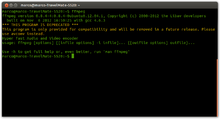FFmpeg
| FFmpeg
|
|
|---|---|

|
|

|
|
| Basic data
|
|
| Maintainer | FFmpeg project |
| developer | Fabrice Bellard |
| Publishing year | December 20, 2000 |
| Current version |
4.3 ( June 15, 2020 ) |
| operating system | Cross-platform |
| programming language | C. |
| category | Multimedia framework |
| License | LGPL 2.1 + / GPL 2+ |
| German speaking | No |
| ffmpeg.org | |
The FFmpeg project consists of a number of free computer programs and program libraries that can record, convert , send ( stream ) digital video and audio material and pack it into various container formats . Among other things, it contains an extensive collection of audio and video codecs with libavcodec .
Technical details
FFmpeg is developed under Linux and other Unix-like systems (Unixoids) and has also been ported to other operating systems and platforms. Well-known programs that use FFmpeg are under Unixoids and Windows the programs MPlayer , VLC , xine and HandBrake , under Windows Mobile and Palm OS the TCPMP .
The project consists of several components:
- ffmpeg is a command line tool to convert from one video, audio or image format to another. It also supports the recording and encoding of a TV card in real time .
- ffserver is an HTTP multimedia or RTP and RTSP streaming server for audio and video transmissions (also live) over the Internet.
- libavcodec includes all ffmpeg audio and video encoders and decoders. All native codecs have been rewritten from scratch, including an H.264 decoder. This library can be used by other programs to then play the films.
- libavformat (Lavf) contains the container parsers and creators for all conventional audio and video container formats (e.g. AVI , MOV , MKV , Ogg / Ogg Media etc.).
Since FFmpeg also contains implementations of codecs for which there are claims - especially in the USA - the use of these formats in countries that recognize such claims may require the payment of fees to licensing organizations (such as MPEG LA ).
Furthermore, two new video codecs originate from the FFmpeg project: A lossless codec called FFV1 and an almost completed codec called Snow , which is based on wavelet transformations and an intelligent variant of area coding .
Libav
On January 18, 2011, several FFmpeg developers announced that they would take over the FFmpeg project. This step was justified by a dissatisfaction with the previous chief developer Michael Niedermayer . The organization of further FFmpeg development should in future be more closely aligned with that of the Linux kernel .
After the takeover of the project failed, the developers split off from the FFmpeg project on March 13, 2011 under the name Libav . From then on, the two Linux distributions Debian and Ubuntu delivered Libav by default . At the same time, the output of the ffmpeg program under Debian and Ubuntu was supplemented with the note that FFmpeg will no longer be developed. After users complained that this was not true because FFmpeg is still being developed, it has now been claimed that ffmpeg is deprecated and that avconv should be used instead . Debian then added the FFmpeg package to its sources again and thus offers both libraries.
In July 2015 the Debian project announced to switch back to the original FFmpeg version. The main reasons given were higher security, a significantly shorter maintenance cycle and the significantly higher number of code contributions and those responsible. Ubuntu followed suit, including "Vivid" ffmpeg in the sources again with version 15.04 and "Wily" removing the packages of the Libav project from the sources with version 15.10 "Wily" .
Shortly after the announcement of the Debian project to switch back to FFmpeg, Michael Niedermayer resigned as head of FFmpeg and justified this with the hope that this would enable the two projects to grow together again.
Legal consideration of the codec collection
FFmpeg (or libavcodec as part of FFmpeg) contains implementations of more than 100 codecs, some of which could be challenged by patent holders .
"In some legislations, due to vague references, patent claims against various standards supported by FFmpeg could possibly be asserted."
Furthermore, many of these codecs have been released under conditions of use that prohibit reverse engineering ; even to ensure interoperability . However, such conditions are ineffective in some countries, for example in Germany ( §§ 69g (2) , 69e UrhG).
Logo and name
The FFmpeg logo is a zigzag scan pattern that supplies the data for entropy coding in MPEG codecs . The logo was adopted by Libav when the project split off . The FF in FFmpeg means fast forward for tape recorders .
Similar software
Web links
- FFmpeg (English) - official website
- Libav (English) - official website
- FFmpeg DirectShow filter - ffdshow
- Graphical user interface for FFmpeg for Unix
- Graphical user interface for FFmpeg for MacOS
- Graphical user interfaces for FFmpeg:
- WinFF (for Windows and Linux)
- Multimedia Xpert
- Quick Time component for Mac OS based on FFmpeg
- FOBS - Java and C ++ Wrapper for integrating ffmpeg in your own programs
Individual evidence
- ↑ git.videolan.org .
- ↑ github.com . June 15, 2020.
- ↑ Blackduck OpenHub Project Summary - FFmpeg . Open hub . Retrieved July 17, 2015.
- ↑ a b FFmpeg License and Legal Considerations . ffmpeg.org. Retrieved August 6, 2014.
- ↑ http://thread.gmane.org/gmane.comp.video.ffmpeg.devel/123868
- ↑ http://ikaruga.co.uk/~snacky/mn.html
- ↑ Libav: News (English) - message on the Libav homepage , March 13, 2011
- ↑ https://bugs.launchpad.net/ubuntu/+source/libav/+bug/939863
- ↑ http://www.linux-magazin.de/NEWS/FFmpeg-ist-zurueck-in-Debian
- ↑ https://lists.debian.org/debian-devel-announce/2015/07/msg00001.html
- ↑ https://wiki.debian.org/Debate/libav-provider/ffmpeg
- ↑ Michael Niedermayer: FFmpegs future and resigning as leader (Fri. 31 Jul 15:53:04 CEST 2015)
- ↑ https://ffmpeg.org/legal.html
- ↑ Which is better: FFmpeg or GStreamer? Why?

